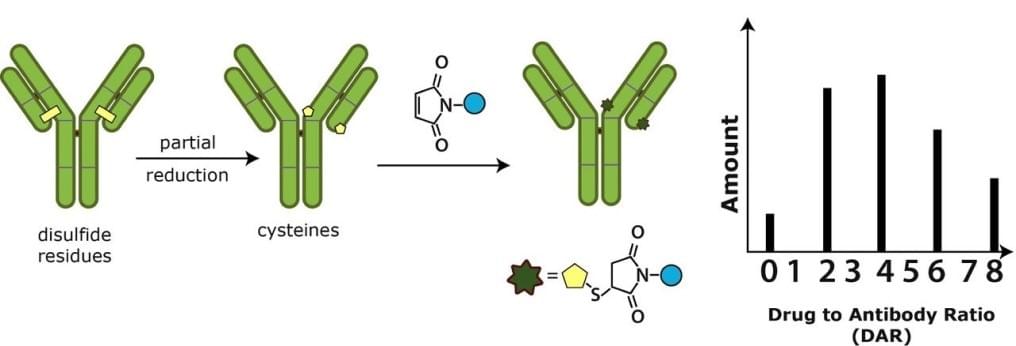Cysteine-based Conjugation Service
Creative Biolabs has established a comprehensive and state-of-art technical platform to provide custom-designed antibody-drug conjugate (ADC) services using cysteine-based conjugation. Creative Biolabs has professional teams with experts and years of enriched experience in ADC development to assist clients to perform robust and cost-effective process to generate ADCs.
 Fig.1 Formation of cysteine-based conjugation.1
Fig.1 Formation of cysteine-based conjugation.1
In ADC development, conjugation through cysteine sulfhydryl groups is one of the conjugation technologies that have progressed to clinical trials. It is an effective strategy that does not require expensive and time-consuming reengineering of the antibody structure. In the strategy of cysteine-based conjugation, the antibody is treated with reducing agents, such as dithiothreitol (DTT) or tris (2-carboxyethyl) phosphine (TCEP), which can convert the inter-chain disulfides to free cysteine residues. Then the sulfhydryl (SH) group of antibody can be conjugated with maleimide-containing linkers to form ADCs. There are 16 cysteine pairs in a full IgG scaffold and the four inter-chain disulfide bonds have greater solvent accessibility and are more susceptible to be reduced than the intra-chain ones. Therefore, it will result in a heterogeneous mixture of ADC species with 0-8 drugs (DAR≤8). In the present clinical trials, the conjugation strategy is usually used to link MMAE, MMAF or duocarmycin. Scientists from Creative Biolabs are also committed to developing innovative approaches to further direct the site of attachment and control the DAR (drug-to-antibody ratio). Several new methods have been established including engineering cysteines and inserting amine acids. Conjugation using antibodies with engineered reactive cysteine residues (Thio-engineered Antibodies) is a cysteine-based site-specific conjugation. This method can produce nearly homogeneous ADCs without significant amounts of unconjugated antibodies. And the resulting ADCs (TDCs) are claimed to have an improved therapeutic index. For inserting amine acids, selenocysteine, a cysteine analogue, can be inserted into antibodies for conjugation and in this concept unnatural amino acid strategies are also explored.
With the combination of an extensive background in antibody engineering and pharmaceutical and the proprietary platforms, Creative Biolabs can provide one-stop full services on ADC development.
There are various strategies used for antibody modification and conjugation:
- Cysteine-based conjugation
- Lysine-based conjugation
- Carbohydrate-based conjugation
- Unnatural amino acids-based conjugation
- Thio-engineered antibody
- Enzymatic modified antibody
- UV photocrosslinking(UV-NBS)
- Meditope-enabled antibodies
Reference
- Peters, Christina, and Stuart Brown. "Antibody–drug conjugates as novel anti-cancer chemotherapeutics." Bioscience reports 35.4 (2015): e00225. Distributed under Open Access license CC BY 3.0. The image was modified by extracting and using only part of the original image.
For research use only. Not intended for any clinical use.
This site is protected by reCAPTCHA and the Google Privacy Policy and Terms of Service apply.

